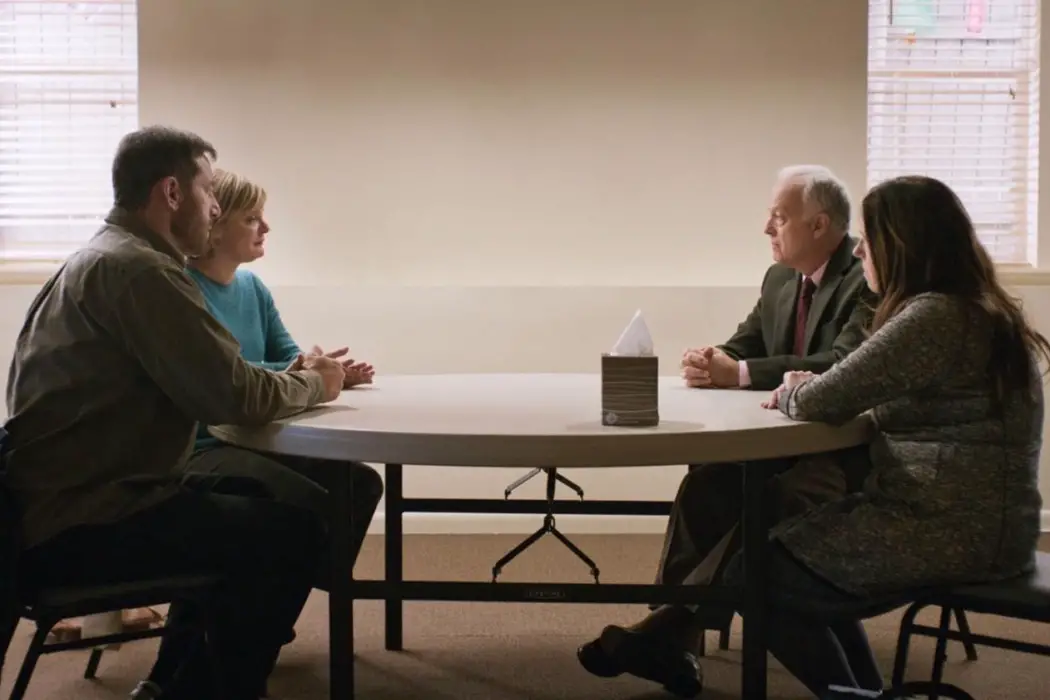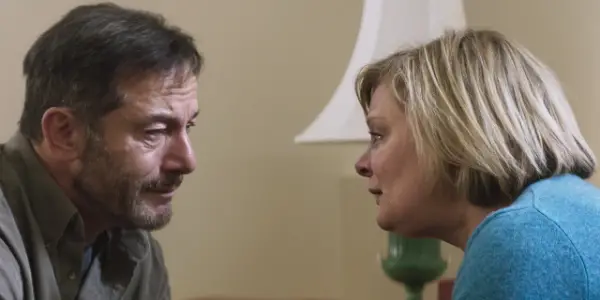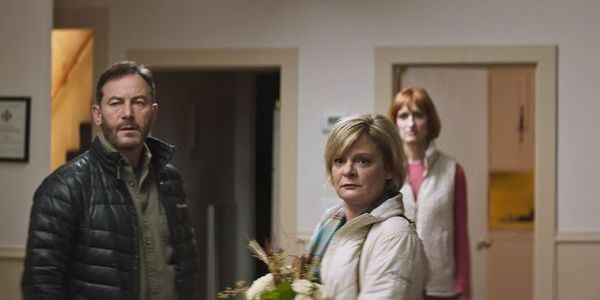Interview With Writer And Director Fran Kranz Of MASS

Wilson is a cinema enthusiast based out of Toronto, Canada.…
Although it’s far from an easily digestible piece of narrative filmmaking, Fran Kranz’s harrowing directorial debut, Mass, has anchored itself as essential viewing ever since it premiered at the 2021 Sundance Film Festival. Kranz spoke with Film Inquiry about how emotionally draining, yet also satisfying, it was to create this vitally important story for the modern American audience. Here’s hoping this current awards season makes the right decision in bestowing the film with some well-deserved accolades.
Wilson Kwong of Film Inquiry: When I first watched Mass, I imagined the whole process of writing and actually making the film must have been pretty emotionally draining. Was that actually the case? And what was it like delving into something so dark and emotional?
Fran Kranz: I mean, it was. I sort of joke that I was crying in front of a laptop for two years. It really is my own exploration or reflection on my own ability to forgive and to heal. I know there’s moments in my life where I’ve wanted forgiveness, where I believed I should grant forgiveness, but just can’t. When I was in my 20s in college, I learned about the Truth and Reconciliation Commission in South Africa. It was amazing and inspiring to see families of victims forgive perpetrators. But it scared me because I knew I couldn’t do that. I couldn’t participate in this notion of restorative justice where you didn’t look for retribution or punishment. You just were looking to heal and find reconciliation.
Of course, I’ve sort of loved the idea, but I really didn’t think I could do it. I’m now a parent and these things happen in our country so often. But I had to confront these thoughts about what would happen if I lost a loved one or, God forbid, the unimaginable of losing a child. I just thought I needed to write about this because it’s exactly what I hope and fear in my life. How do you move forward? The work you have to put in to move forward and find some kind of acceptance or healing, and the challenge of it. I just became obsessed, but it was incredibly emotional. It’s emotional talking about it and it’s still emotional watching it.
And just in terms of the film focusing on two sets of parents, was that always the plan? Because I assume through your research and reflection on the subject, you probably thought about multiple angles in which to approach the story?
Fran Kranz: I loved the – and I don’t want to say the simplicity – but that’s all it was. What I found is its parents becoming victims, and perpetrators are families of victims, families of perpetrators. It’s about people who disagree or people that feel blamed for each other or towards each other; people who feel hate towards each other. We live in this incredibly divided country. The rhetoric is scary and so heated. There doesn’t seem to be an ability to listen or compromise, or at least not in the way you would hope. And social media, it’s just this cesspool of people yelling at each other and kind of normalizing hating and speaking so terribly about people they don’t even know.
And so I think on some level, the film is about the extraordinary way that humans can still potentially sit down across from a table and work through something, find some common ground, and find some sort of shared humanity in order to move forward. So I wanted it simple and I never wanted to leave the room. I didn’t want flashbacks or a score. I wanted to celebrate that people can do this and let’s watch it, and let’s be stuck with them. Let’s feel the challenge, feel the exhaustion, and feel how difficult it is.

I definitely liked how for the most part, the film takes place in a single room, but still feels very kinetic. How did you approach the film knowing that it was going to mainly take place within a single room, but wasn’t stage play either?
Fran Kranz: I appreciate that. I mean, it sounds like you obviously noticed and appreciated that there was something sort of happening, right? Because I’m a first time director, I had to expose myself. I had to tell everyone I didn’t know what I’m doing because I didn’t want to overreach or try too much. I have this mantra of never let the director get in the way, and that the director should be invisible. I looked at My Dinner with Andre and 12 Angry Men, and movies that work in rooms so we didn’t have to totally reinvent the wheel.
On the other hand, Ryan Jackson-Healey, my cinematographer, also felt we had to mirror with the camera. The camera has to evolve and follow the emotional arc or state of the characters. So we had this very basic system: two shots, singles and from the side, but we did have some French overs too. We shot the conversations chronologically so as they had more emotion and eventually derailed, the camera would mirror that. We slowly introduced movement and eventually do get handheld. But the cameras were essentially always in the same place because we had to work with our sunlight. It was shot in Idaho in November, so it was true daylight by 9:00 AM and then sun down at 5:00 PM because we were in a valley. We had very little time so we were stuck, and essentially kept it simple and stylized the simplicity. Then, when Billy had a big perspective shift where we switched from spherical lens to anamorphic lens, essentially showing that when you lose someone, when tragedy strikes, grief can change the way you see the world. We wanted to illustrate that shift in perspective with the camera.
Given how quickly you had to shoot everything, how was it like packing all that both for you and your actors?
Fran Kranz: We had 14 days. The conversations, when the door closes on the parents and they’re alone, that was eight days. We had a two and a half day rehearsals to get through the script and figure out everything that was wrong and what didn’t work. These four actors are better than I am. I mean, they’re as good as it gets. And so I didn’t think I had the confidence or the time even to sit there and talk to them about how you get emotional. They know how to do that. What I needed to do was make sure they understood every beat and that more importantly, the beats were there. That there wasn’t a step missing. If Martha [Plimpton] or Jason [Isaacs] felt like I was phoning a moment in, or wasn’t quite sure why I’m saying that, I would rewrite it and I would make it so that the script was seamless and could carry them to these emotional peaks or valleys.
Once we got to Idaho, it was so fast. But the actors, when we talk about it now, we’ve reflected on it and we wouldn’t have wanted more time. It was so intense and we had these 10-12 page days, 15-minute takes. You went in and you just gave it everything. You just let down the armour and were just completely vulnerable and trusting of one another. It was almost like capturing theatre, and if you might’ve had too much time to overthink it and be precious about it, you might feel that you don’t have to let go completely. There was a sense of the urgency to it that almost forced us to just say we have no other choice but to let everything go here and just give it everything.

I read in one of your other interviews that your experience working on stage with Mike Nichols really informed how you approached preparing your actors. Can you elaborate on that?
Fran Kranz: I did Death of a Salesman with Mike Nichols on Broadway. I remember, you have about five weeks of rehearsal before you get into a theatre and do tech and really started to get the nuts and bolts of the lighting. But we were going into the fourth week with Mike, and he basically sat in his chair the entire time and just told stories. Even the veterans like Phillip Seymour Hoffman and Bill Camp, there was starting to be these rumblings of when are we going to block this? What is going on? He’s not telling us the blocking. And looking back, the plan was amazing and we blocked it easily.
I think what he was doing was essentially getting us into the story, and connecting us through stories that he shared so much of himself. He told us embarrassing stories, hilarious stories, tragic stories; he just was this open book and it allowed for us to start doing the same with each other. That he had set this bar of honesty and vulnerability, so we could just access our emotions and trust one another so easily before we went in to do this play about a family, tragedy and heartbreak. So I only had two and a half days, but I was committed to walking into that room with my actors and doing the same and embarrassing myself or whatever it took.
And I think it’s interesting that you might have initially conceived Mass to be a play, and later changed it into a film? Did the overall structure of what the film ended up being change as you went from play to film, or did we essentially end up with the same story?
Fran Kranz: The first drafts were screenplays, but it was probably in a couple of months or so that I thought, “Maybe this should be a play.” I love theatre and it felt like a play. And my first screenplays were just in the parish hall. Even as a screenplay, I hadn’t thought about going outside, which seems ridiculous. I think the benefit of it being a play for several months, because I did obviously switch back to a film, was when my heart was set on a movie, it forced me to make that conversation compelling. As a play, I could not do flashbacks. I could not leave the room and I didn’t want to. I believed we had to stay there to honour what these people are doing, the strengths that it takes. But as a stage play, you have no conveniences. You have no way out. I had no choice but to make it as seamless and flowing and as complicated and as human as possible. I’m not sure what the dialogue would have been like if I had always thought of it as a film. I think something definitely benefited from those months it was a play.
Film Inquiry would like to thank Fran Kranz for taking the time to speak with us!
Mass is now available to rent!
Does content like this matter to you?
Become a Member and support film journalism. Unlock access to all of Film Inquiry`s great articles. Join a community of like-minded readers who are passionate about cinema - get access to our private members Network, give back to independent filmmakers, and more.
Wilson is a cinema enthusiast based out of Toronto, Canada. He escapes from his day job by writing random thoughts about cinema on the internet. Although he has a longstanding penchant for Hong Kong cinema, he considers himself to be an advocate for Asian cinema in general. He has been attending the Toronto International Film Festival every year since 2005, and more of his work can be found on his website: www.wilson-kwong.com.













